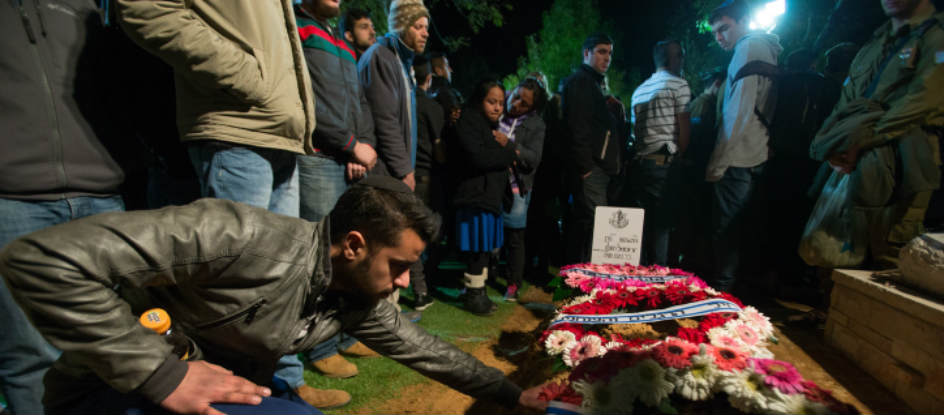The death of a single Jewish officer, far away from home, touched a nerve among Israelis, awakening the feeling of brotherhood at Mount Herzl cemetery.

I have to be honest: when I got up last Wednesday, I did not imagine that my day would end with a funeral at the military cemetery.
On Tuesday of last week, during a training exercise at the Tze`ilim army base in the south of Israel, a group of soldiers mistakenly fired a mortar in the wrong direction, hitting another group training nearby. A 23 year-old soldier, Lieutenant Yishai Rosales, was killed, and another soldier was lightly wounded. (After his death, Lieutenant Rosales had his rank upgraded from Lieutenant to Captain, as per the IDF norm.)
On Wednesday evening, a number of news sources reported that Yishai Rosales` funeral had been scheduled for late on Wednesday night, and the family had called for Israelis—even if they did not know the fallen soldier personally—to come to the funeral and pay their respects. The late hour, the lack of public transport at that time, the cold Jerusalem weather and the short notice made me think that the response would be underwhelming.
Thankfully, the Jewish people proved me wrong.
All Roads lead to Mount Herzl
Major Rosales made Aliya with his parents and brother from Mexico, but most of his friends and family remained there. The funeral was scheduled for one in the morning between Wednesday and Thursday, and the family was worried that due to the lack of friends and the late hour, the funeral would be poorly attended.
A thought kept coming back to me: Would the Israeli public connect less to this story, because he had not fallen in combat, but was rather killed in a training accident? I was mulling over this thought as I picked up two of my friends, and we made our way towards Mount Herzl.

It is rare for someone to be happy to get stuck in traffic, but this was undoubtedly one of those moments. As I sat there in the traffic I smiled a little—not because I was happy, but because I was touched at how many people had dropped everything and come to the funeral. It was quarter to one in the morning, an hour when the streets are normally empty, but there I was, in a stream of cars inching its way towards the cemetery.
Just after one, we parked the car and began walking towards the cemetery. Despite the cold, hundreds of us were walking to the funeral—hundreds that soon turned into thousands: men and women, old and young, soldiers and citizens. Haredim with their black hats and Shtreimels, alongside teenagers with their Mohawks – every sector of the Jewish people was represented there.
The funeral began, and heartfelt eulogies were made in Spanish. Everything was translated into Hebrew—but frankly, there was no need for a translation for all of us to understand the pain and the heartbreak that was being expressed.
Boundaries transcended
I am not sure what exactly did it for me—walking late at night between the graves of all the fallen soldiers, or the silence of the night shattered by the military salute, or simply the amount of people who arrived at such short notice. Probably, it was all these things combined.
But suddenly, all those famous clichés about our people`s unity became a reality in front of my eyes. We Israelis may argue about almost everything (“Two Jews, Three synagogues”) but we, collectively and as a society, are unwilling to allow a person who gave so much for his country to not receive the respect due to him. In that moment, all our differences became irrelevant.
I don’t know if this is a feature we developed as a people over the years, or if it is somehow in our DNA, but despite the significant differences between the man with Shtreimel and the boy with Mowhawk, the woman with the long skirt and the woman with skinny jeans, we know that what unites us is greater than what divides us.
Some see in Israeli society one large family feud—all I saw last week was brotherly love.
Translation: Aharon White
To receive updates on new articles in English, join Mida on Facebook or Twitter or join our mailing list.




